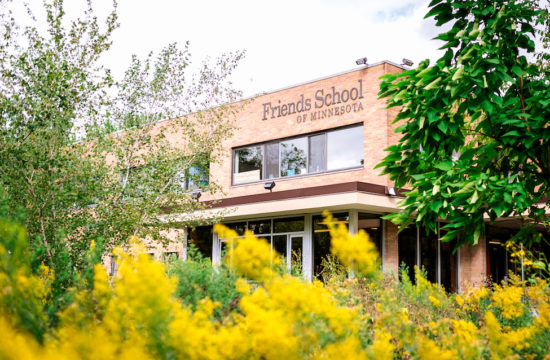We believe that our commitment to this work will provide our children with the foundational knowledge and skills that will help them create a world where oppression and the many forms of suffering that it causes no longer exist.
Preface to This Statement
The purpose of this statement is to document and describe FSMN’s core philosophy regarding Diversity, Equity and Inclusion (DEI). It is meant to describe commitments, identify actions, and acknowledge the context of DEI in the ongoing work of the school across all functional areas, including program, operations, and community. This statement will be used to inform, guide, and hold the school accountable for the decisions and behaviors of its community members at all levels, from strategic governance to the day-to-day practices and behaviors of individuals.
Our Equity Statement highlights racial justice in consideration of the unique historic, sociocultural, and sociopolitical origins of the United States. In this country, racial inequity was born from enslavement, colonization, usurpation of territory, and genocide, and it has continued with policies and practices that were designed to benefit the dominant, White population (see McNair et al. 2020). Although this statement centers racial justice, it does not preclude us from addressing other forms of inequity. Indeed, FSMN is committed to addressing all forms of oppression, including those based on income, gender, sexuality, culture, and (dis)ability and more.
As a community, we recognize that we are all in ongoing states of development and may be at different points in our understanding of systemic oppression and racial equity and how they intersect with the work of our school. We are committed to treating all community members with compassion, recognizing our humanity, even as we hold ourselves accountable to the commitments of this statement
Equity Statement Background
Foundation:
Grounded in the Quaker testimonies of peace, justice, equality, simplicity, and integrity, Friends School of Minnesota believes education serves as a means to reveal the inner light in us all and to honor our shared humanity. Diversity of thought, experience, belief and identity provide the best context for educating for democracy. We believe education is an act of truth-seeking in community and a pathway for the liberation of all people.
Throughout history, Quakers have been leading voices in justice movements. In this country, many Quakers were leaders in the abolitionist movement, early founders of the suffrage movement, and they played a pivotal role in the civil rights movement. To this day, Quakers continue to push the narrative of social and environmental justice for all people.
As part of our legacy as a Quaker school, we have a clear calling to create and maintain high standards of diversity, inclusion, and equity as we educate students, build community, and dream to create a better, more just world.
Following the Quaker principle of continuing revelation, we commit to continually and purposefully revising this imperfect statement to reflect our learning and better meet the needs of our community. This statement’s imperfections should not be taken as a lack of commitment to the work, but as evidence of the will to take action even if we don’t have all of the answers.
Working Definitions
For the sake of this work, our school is operating with the following definitions:
Diversity comprises the multiple differences and similarities in perspectives, identities, and experiences among community members.
Inclusion is the ongoing process of intentionally creating environments that truly value the diverse histories, contributions, knowledge, and experiences of all of its members.
Equity is a commitment to creating fairness, access, impartiality, and social justice in the formation of rules, policies, and institutions.
Black is a complex identity that refers to a rich culture and lived experience. This term may refer to people of the African Diaspora, with an identity that lives in the context of many different forced and voluntary migration periods. Black and African American have been used interchangeably as a cultural identity.
Indigenous refers to the cultural identity of people descending from the indigenous populations of our region.
White supremacy is the idea that white culture and people are superior to other cultures and races, particularly Black people. White supremacy, like racism, is a system of beliefs that can be found in many fundamental parts of our culture.
Anti-racism/Anti-racist is a way that all people, regardless of race, can orient themselves toward justice, the eradication of racism, and disrupting white supremacy.
Equity Statement Vision
We believe that there are concrete mechanisms in the everyday workings of our school that can bring forth the inner light inherent in us all. Seeking this shared humanity in ourselves and in others is an act of liberation.
Holding this, we seek to create a school with parents, teachers, and students that recognizes the collective dignity and humanity of all people.
We envision a school that is courageous, welcoming, respectful, and human, a school where all members can discuss, share, imagine, and heal as we seek truth in community.
We envision a school where learning takes place as a means to redress the violence embedded in Minnesota’s and our nation’s history, both physical and emotional, as we learn about and identify systems of oppression and pull back layers of trauma. We seek to ground this work in hope as we prepare children to embrace life, learning, and community and to collectively experience the uplifting and activating love that their understanding reveals.
We are committed to unifying our community in developing an equity mindset so staff, parents, school committee, and students learn to see even the small ways resources, access, and opportunity are distributed in unjust ways across race, socio-economic status, gender identity, sexual orientation, (dis)ability, and the other myriad and intersectional ways injustice plays out in our society.
Equity Statement Actions
We commit to the following actions, and we continue to build and apply an equity mindset to all areas of school life.
We will:
Design, deliver and continually revise curriculum that is explicitly anti-racist, that seeks to uplift those systematically denied value or even existence, and that educates children about the ways in which social inequality and exclusion are created and maintained.
Identify and correct practices, policies, and procedures that inadvertently or intentionally lead to exclusion or inequity. Hiring, admissions, and retention should model social equity and inclusion among students, families, employees, governance, and the extended network of support. To achieve that fully, we will use hiring and admissions criteria and practices that acknowledge the historical barriers to opportunity, access, and resources faced by Black, Indigenous, people of color, and any groups who experience oppression due to their income, gender, sexuality, culture and/or ability. We seek not just to “have more diversity,” but to create a space where diverse people can thrive as they learn and work.
Foster or create a school climate that prioritizes dialogue about race, gender, ability and equity. As a Quaker progressive school, conversations about justice need to be the norm rather than the exception.
Educate about dismantling white supremacist culture. Historically, Friends School of Minnesota has been a predominantly white institution in a geographic region marked by white settlement and the exclusion of Indigenous people. In this context, to end white supremacy, we must be explicit about the history of place, and about the insidious ways white supremacy plays out in our communities. The burden of educating people about this should not land on our community members of color.
Provide ongoing professional development on equity literacy for faculty, staff, administrators, and governance. Make sure to include equally relevant and resourced opportunities for Black, Indigenous, people of color as well as LGBTQIA+ and differently abled individuals to learn, grow, and experience affinity and community. Persistent development is required to undo the messages we are constantly receiving in our current societal culture.
Maintain staff level and board level committees dedicated to addressing equity related issues in the day-to-day as well as strategic operations of the school. Until an equity mindset guides all we do, formal faculty, staff, and governance committees will need to drive this work and hold us accountable to our commitments.Continually and purposefully revise this statement. We see this imperfect statement as a starting point and fully anticipate adding, retracting or changing the language and goals, as we learn more and as the community further articulates its needs. We commit to reviewing and revising it at least annually.
Acknowledgements
It is one thing to state our intentions and celebrate the values and history of Quakerism, but it is quite another thing to make them real in the life of our school. For this work to move forward in our community, we must make several acknowledgements.
We acknowledge that while Quakers believe that there is that of God in each human, leading to a strong, collective moral conscience, particularly concerning equality, not all Quakers are or have been, themselves, paragons of justice.
In the United States, histories of settler colonialism and slavery that prioritized the success and advantage of white people at the expense of people of color, particularly Indigenous and Black people, continue to permeate our social systems today. In Minnesota, Friends School of Minnesota sits on land stolen from Indigenous people, specifically the traditional, ancestral, and contemporary lands of Dakota people.
Education in the United States has not resulted in equitable outcomes for all children and liberation for all people. Schools and education have been tools of oppression. Despite the good intentions of some educators, many schools today continue to perpetuate white supremacy, misogyny, ableism, classism, homophobia, and transphobia.
We acknowledge our position as an institution of education in creating and maintaining these oppressive structures. We also answer the call of our values and commit to dismantling these structures in our curriculum, administrative structure, educational philosophy, and practice.
In truth, this has always been Friends School of MN’s intent, but it hasn’t been our impact. It is our hope to minimize the amount of harm that occurs in our spaces but we know we have made mistakes and have experienced setbacks. Sometimes these mistakes have caused harm. As we work toward being more equitable in our work, we plan to share our progress and setbacks with the hope that it brings everyone closer to justice. We do so with humility and without the illusion that we will be perfect, but with the full understanding that this is our work as a Quaker, progressive school.
Sources
Bush Foundation Equity Statement https://www.bushfoundation.org/equity-statement
Education for Liberation Network, https://www.edliberation.org/
Equity & Justice Working Group of Friends School of Minnesota (included teachers, staff members, current parents, and parents of alumni)
Free Minds, Free People Conference (Twin Cities, 2019) http://fmfp.org/
Friends Journal, https://www.friendsjournal.org/
The work of Dr. Paul Gorski, including Avoiding Racial Equity Detours (2019), Equity Literacy: More than Celebrating Diversity (2016), Equity Literacy for All (2015), and (with Julie Landsman) The Poverty and Education Reader: A Call for Equity in Many Voices (Stylus Publishing, 2014), and the institute he founded, Equity Literacy Institute, https://www.equityliteracy.org.
The work of Ibram X. Kendi, including How to Be an Antiracist. Vintage, 2020.
Lewis, Amanda E. Despite the Best Intentions: How Racial Inequality Thrives in Good Schools. New York, NY: Oxford University Press, 2017.
The work of Dr. Bettina Love, including We Want to Do More Than Survive: Abolitionist Teaching and the Pursuit of Educational Freedom (Beacon Press, 2020).
McNair, Tia Brown, Estela Mara Bensimon, and Lindsey E. Malcom-Piqueux. 2020. From Equity Talk to Equity Walk : Expanding Practitioner Knowledge for Racial Justice in Higher Education. Newark: John Wiley & Sons, Incorporated
Taina Coaching and Training, https://www.tainacoachingandtrainingllc.com/
Villanueva, Edgar. Decolonizing Wealth: Medicine to Heal Divides and Restore Balance. Berrett-Koehler, 2018.
Yaffe, Deborah. Other People’s Children: The Battle for Justice and Equality in New Jersey’s Schools. New Brunswick, NJ: Rivergate Books, 2007.


